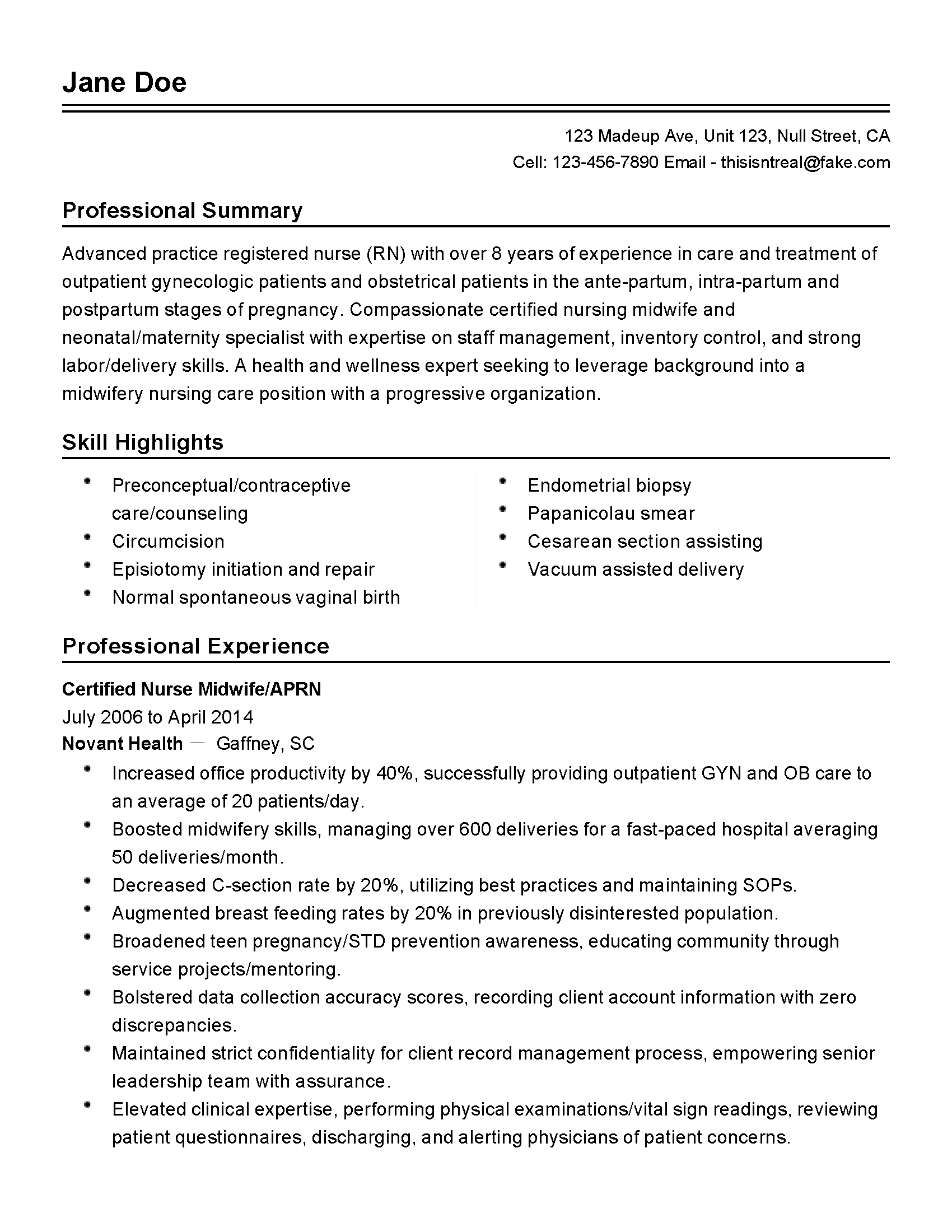Why this resume works
- Highlights industry-specific skills: The resume highlights nursing skills through roles that demonstrate patient care management, training new nurses, and implementing efficiency improvements in healthcare settings.
- Quantifies accomplishments: Metrics like reducing patient wait times by 20% and increasing efficiency by 15% clearly quantify the candidate’s impact on improving healthcare delivery processes.
- Uses action-oriented language: Action verbs such as ‘managed,’ ‘reduced,’ and ‘trained’ create a dynamic narrative, effectively engaging the reader with specific examples of proactive contributions.
More Registered Nurse Resume Examples
Take a look at our registered nurse resume examples to learn how to highlight your clinical skills, patient care experience, and healthcare expertise. These samples will help you craft a nursing resume that stands out in your field.
Entry-level Registered Nurse
Why this resume works
- Touches on accomplishments: The resume underscores specific accomplishments by listing a couple of bullet points showcasing work on high-impact projects involving patient education and electronic health record systems.
- Features education section: The education section is well-organized, highlighting academic achievements like graduating with honors and making the Dean’s List, emphasizing strong foundational knowledge early in the career.
- Puts skills at the forefront: Skills are prominently displayed, showcasing key competencies such as medication administration and patient assessment upfront, effectively presenting the candidate’s capabilities for an entry-level role.
Mid-level Registered Nurse
Why this resume works
- Includes mix of soft and hard skills: The resume seamlessly blends technical and interpersonal skills, highlighting expertise in patient care while emphasizing leadership qualities and team management experience.
- Demonstrates language abilities: Language skills are prominently noted, showcasing the ability to communicate effectively across cultures and enhancing patient care through fluency in English, Spanish, and conversational French.
- Displays technical expertise: Technical expertise is showcased through industry certifications like Certified Nurse Manager and Advanced Cardiac Life Support, reflecting a commitment to maintaining high standards in healthcare.
Experienced Registered Nurse
Why this resume works
- Lists relevant certifications: The resume lists key certifications like Certified Emergency Nurse and BLS, highlighting a commitment to expertise and ongoing professional development.
- Showcases impressive accomplishments: Showcasing accomplishments such as achieving a 95% patient satisfaction rating and reducing readmission rates by 10% emphasizes significant senior-level impact.
- Emphasizes leadership skills: Leadership skills are underscored through roles that involve supervising nursing staff and mentoring interns, demonstrating the ability to lead and guide teams effectively.
Registered Nurse Resume Template (Text Version)
Aya Lee
Maplewood, NJ 07047
(555)555-5555
Aya.Lee@example.com
Professional Summary
Dedicated and experienced Registered Nurse with 6 years of expertise in patient care, clinical management, and healthcare protocols. Proven track record in enhancing patient satisfaction and healthcare efficiency, with strong skills in emergency procedures and team training. Fluent in English and Spanish, with advanced certifications in ACLS and BLS.
Work History
Registered Nurse
Harmony Health Center – Maplewood, NJ
March 2023 – March 2025
- Managed patient care for 50+ patients daily
- Reduced patient wait times by 20%
- Trained 10 new nurses on patient care protocols
Nursing Coordinator
Greenfield Hospital – Newark, NJ
March 2020 – February 2023
- Supervised a nursing team of 25 personnel
- Implemented a new triage system, increasing efficiency by 15%
- Liaised with medical staff for optimal patient care
Clinical Nurse
Meadowbrook Clinic – Jersey City, NJ
March 2017 – February 2020
- Monitored and recorded patient vitals for 30+ patients daily
- Enhanced patient care protocols, boosting satisfaction by 25%
- Assisted with emergency procedures
Skills
- Patient Care
- Clinical Management
- Emergency Procedures
- Triage Systems
- Healthcare Protocols
- Training & Development
- Medical Record Keeping
- Patient Communication
Education
Master of Science in Nursing Nursing
Boston University Boston, Massachusetts
May 2017
Bachelor of Science in Nursing Nursing
University of Massachusetts Amherst, Massachusetts
May 2015
Certifications
- Advanced Cardiac Life Support (ACLS) – American Heart Association
- Basic Life Support (BLS) – American Heart Association
Languages
- English – Beginner (A1)
- Spanish – Beginner (A1)
- French – Intermediate (B1)
Popular Skills for a Registered Nurse Resume
A well-designed resume skills section is crucial for a registered nurse, as it highlights both the technical abilities and personal qualities essential for the job. Blending hard skills like patient care and medical knowledge with soft skills such as empathy and teamwork is fundamental to thriving in this role.
Below are a few of the top soft skills frequently listed on registered nurse resumes.
| Soft Skills | % of resumes with this skill |
|---|---|
| Strong clinical judgment | 31.10% |
| Compassion and empathy | 29.86% |
| Patient and family advocacy | 27.70% |
| Team coordination | 24.22% |
| Professional bedside manner | 17.41% |
Here are a few examples of hard skills frequently included on registered nurse resumes.
| Hard Skills | % of resumes with this skill |
|---|---|
| Direct patient care | 53.38% |
| Patient assessments | 51.44% |
| IV administration | 50.55% |
| Medication administration | 43.19% |
| Documentation and charting | 31.11% |
Related Resume Guides
- Geriatric Nurse Practitioner
- Hemodialysis Nurse
- Intensive Care Nurse
- Labor And Delivery Nurse
- Licensed Practical Nurse
- Neonatal Nurse
- NICU Nurse
- Nurse Anesthetist
- Nurse Practitioner
- Nursing Aide And Assistant
- Nursing Assistant
- Nursing Unit Clerk
- OB Gyn Nurse
- Oncology Nurse
- Operating Room Nurse
- Patient Care Associate
- Patient Care Technician
- Pediatric Nurse
- Perioperative Nurse
- Pre Post Operating Nurse
- Private Duty Nurse
- Public School Nurse
- Shift Coordinator
- Trauma Nurse
Advice for Writing Your Registered Nurse Resume
Not sure how to make a resume for a registered nurse job? No worries—we’ve got you covered. We’ll walk you through the best way to showcase your nursing skills, experience, and love for patient care. Whether you’re new to the field or aiming for the next step in your career, you’ll find practical tips to help your resume stand out in healthcare.

Include relevant certifications and training
Listing certifications, licenses, and specialized training is crucial for a registered nurse. These credentials show your expertise and skills in specific areas of nursing. They also demonstrate your commitment to continuous learning and professional development. Creating a dedicated “Certifications” section on your resume helps to highlight these important qualifications clearly.
Here are five certifications you’re likely to see on a registered nurse resume:
- Basic Life Support (BLS)
- Advanced Cardiovascular Life Support (ACLS)
- Pediatric Advanced Life Support (PALS)
- Certified Critical Care Nurse (CCRN)
- Certified Emergency Nurse (CEN)
Adding this section alongside your education section enhances your resume by showcasing both your academic background and practical skills. This makes it easier for employers to see that you have the necessary qualifications for a registered nurse role.
Let’s see what a certifications section looks like in action.
Example of a certifications section
Basic Life Support (BLS)
Issued by: American Heart Association
Expires 2024
Advanced Cardiovascular Life Support (ACLS)
Issued by: American Heart Association
Expires 2025
Pediatric Advanced Life Support (PALS)
Issued by: American Heart Association
Expires 2025
Certified Emergency Nurse (CEN)
Issued by: Board of Certification for Emergency Nursing (BCEN)
Issued 2023
Certified Pediatric Nurse (CPN)
Issued by: Pediatric Nursing Certification Board
Issued 2022
Highlight your skills quickly! Our resume builder helps you create a professional resume fast, making sure you stand out to employers.
Write a strong professional summary
A professional summary is a concise introduction at the top of your resume, showcasing your skills, experience, and accomplishments. For an experienced registered nurse, this section should illustrate years of patient care expertise, clinical proficiency, and any specializations. It effectively creates a strong first impression by quickly demonstrating to hiring managers why you are an excellent fit for the position.
If you have limited work experience, like new graduates or entry-level candidates, consider using a resume objective. This highlights your career aspirations and how you intend to contribute to the healthcare team. Use dynamic language to stress what you can bring to the table; for instance, mention specific nursing competencies such as patient assessment or medication administration.
When crafting your summary or objective, begin with a compelling statement about who you are as a nurse. Next, emphasize key skills and achievements pertinent to the role. Arrange your points clearly for easy readability. This strategy will help grab attention and demonstrate that you are prepared to make an impact as a registered nurse.
Registered nurse resume summary examples
Entry-Level
Compassionate and dedicated recent nursing graduate with a Bachelor of Science in Nursing (BSN) from XYZ University. Certified in Basic Life Support (BLS) and Advanced Cardiovascular Life Support (ACLS). Possesses strong foundational skills in patient care, health assessment, and clinical decision-making. Eager to contribute to a healthcare team and provide high-quality care to diverse patient populations.
Mid-Career
Experienced registered nurse with over 5 years of hands-on experience in medical-surgical and critical care units. Proficient in developing and implementing patient care plans, administering medications, and collaborating with interdisciplinary teams. Known for exceptional patient advocacy, strong organizational skills, and the ability to handle high-stress environments effectively. Holds certifications in Critical Care Nursing (CCRN) and Pediatric Advanced Life Support (PALS).
Experienced
Highly skilled registered nurse with 15+ years of experience specializing in emergency and trauma care. Demonstrated leadership abilities as Charge Nurse, adept at managing clinical staff, coordinating complex cases, and improving department workflows. Board-certified Emergency Nurse (CEN) with additional specialization in Trauma Nursing Core Course (TNCC). Proven track record of enhancing patient outcomes through evidence-based practices and advanced clinical interventions.
Registered nurse resume objective examples
Recent Graduate
Dedicated and compassionate recent nursing graduate with a BSN from an accredited program seeking an entry-level registered nurse position. Eager to apply clinical skills, patient care expertise, and evidence-based practice knowledge in a supportive healthcare setting. Committed to providing high-quality, empathetic care to diverse patient populations.
Career Changer
Passionate healthcare professional transitioning to a registered nurse role, bringing extensive experience in medical assisting and patient support. Recently completed an accelerated BSN program and eager to leverage strong interpersonal skills, clinical training, and dedication to patient advocacy in a collaborative nursing team.
Specialized Training
Licensed Registered Nurse with certifications in Advanced Cardiac Life Support (ACLS) and Pediatric Advanced Life Support (PALS) seeking an entry-level RN position at a reputable hospital. Enthusiastic about utilizing specialized training and hands-on clinical experience to contribute to patient care excellence and positive health outcomes.
A combination resume format is a great choice if you need to highlight required certifications upfront. It balances your skills and credentials with your experience, ensuring employers see your qualifications right away.
Showcase your work experience
Highlighting your work experience on your resume is essential for a registered nurse. It helps employers see your background and suitability for the role. To make a strong impression, list your work history in reverse chronological order, starting with the most recent position. For each job, include the title, employer name, location, and employment dates.
When detailing your duties and achievements, use clear and action-oriented bullet points. Focus on measurable results to demonstrate the impact of your contributions. For instance, instead of “Provided patient care,” say “Administered medication to 15+ patients daily, resulting in a 20% improvement in patient recovery times.” Highlight core responsibilities such as patient assessment, care planning, administering medications, and collaborating with healthcare teams.
Include specific skills like IV therapy, wound care management, electronic health records (EHR) proficiency, and emergency response to show your competence in essential nursing tasks. By clearly outlining your experiences and achievements with concrete examples and measurable outcomes, you can effectively showcase your qualifications to potential employers.
5 registered nurse work history bullet points
- Administered medications and treatments to 50+ patients daily, achieving a 95% patient compliance rate.
- Developed and implemented patient care plans for diverse medical conditions, resulting in a 20% improvement in patient recovery times.
- Provided education and support to patients and families, enhancing patient satisfaction scores by 15%.
- Collaborated with multidisciplinary teams to coordinate comprehensive care, reducing hospital readmission rates by 10%.
- Managed electronic health records with a focus on accuracy, decreasing documentation errors by 25%.
Incorporate keywords from the job posting in your resume to enhance visibility with applicant tracking systems (ATS) and attract recruiters.
Match your resume with the job description
Customizing your resume to align with job descriptions is crucial as it enhances your visibility to employers and increases the likelihood of your resume passing through ATS-friendly resume systems.
Start by thoroughly examining the job posting for a registered nurse position. Identify key keywords and phrases that are repeatedly mentioned, such as “patient care,” “medication administration,” or “electronic health records.” These terms indicate what the employer prioritizes in a candidate.
Incorporate these keywords into your resume by revising your experiences and skills to reflect the job description. For example, if the job posting highlights “providing high-quality patient care,” you can include a bullet point like: “Delivered high-quality patient care to ensure optimal outcomes.” This approach not only demonstrates that you possess the necessary skills but also increases your chances of being noticed by ATS software.
To effectively emphasize your achievements, organize sections clearly with headings like “Professional Experience” and “Skills.” Under each heading, use bullet points to detail specific duties and accomplishments.
For instance: “Administered medications accurately and efficiently while maintaining meticulous patient records using electronic health systems.” This strategy ensures that your resume is easy to read and aligns with what employers seek in a registered nurse. Remember to customize your resume for each application to maximize its impact.
Make sure your resume gets noticed by using our ATS Resume Checker! It helps you find and fix problems like missing keywords and bad formatting so your application stands out.
Salary Insights for Registered Nurses
Salaries can vary based on your location and job title. Looking at industry pay trends can help you compare earnings and make informed career decisions. Check out the details below.
Top 10 highest-paying states for registered nurses
Our salary information comes from the U.S. Bureau of Labor Statistics’ Occupational Employment and Wage Statistics survey. This official government data provides the most comprehensive and reliable salary information for registered nurses across all 50 states and the District of Columbia. The figures represent the most recent data available as of May 2023.
The national average salary for registered nurse is $86,661.
| State | Average Salary |
|---|---|
| California | $137,690 |
| Hawaii | $119,710 |
| Oregon | $113,440 |
| Washington | $111,030 |
| Alaska | $109,210 |
| Massachusetts | $108,850 |
| District of Columbia | $106,850 |
| New York | $106,620 |
| New Jersey | $101,960 |
| Connecticut | $101,840 |
FAQ
Do I need to include a cover letter with my registered nurse resume?
Attaching a cover letter to your registered nurse resume is beneficial, even if not required.
Cover letters allow you to emphasize why the position and facility appeal to you and how your background matches their criteria. For example, noting your experience in a cardiac care unit when applying to a hospital renowned for such services can strengthen your application.
Additionally, it provides a platform to express your dedication to patient care and highlight unique skills or experiences that may not fit into a resume. This demonstrates your enthusiasm and suitability for the role, helping you stand out from other applicants.
Check out cover letter examples for inspiration, or use our Cover Letter Generator to make yours effectively.
How long should a registered nurse’s resume be?
For resume length, it’s best to keep yours to one page for conciseness and ease of review by hiring managers. Nevertheless, if your experience is substantial or you possess advanced specialties, a two-page resume can effectively showcase your qualifications.
Emphasize recent and pertinent roles, certifications, and achievements. By highlighting skills such as patient care, collaboration, and specialized training, you can make your resume stand out while retaining the reader’s interest. Ensure every line is clear and relevant for maximum impact.
How do you write a registered nurse resume with no experience?
If you have limited work experience, highlight your skills, education, and relevant training on your registered nurse resume to show your preparedness for the role.
Here are a few tips on how to craft an entry-level registered nurse resume:
- Prioritize education and licensure: Start with your nursing degree details, including school name, graduation date, and any honors. Follow with RN licensure information, including the state and additional certifications like BLS or PALS.
- Use clinical rotations as experience: Treat clinical rotations as practical experience. Detail each rotation with specifics about tasks performed such as patient assessments, administering medications, and teamwork within the healthcare setting.
- Showcase relevant skills: If you gained healthcare skills from roles like CNA, medical assistant or clinic receptionist through work or volunteering, ensure these are prominently displayed on your registered nurse resume.
For further examples and actionable advice from Certified Professional Resume Writers, check out our guide on writing a resume with no experience.
Rate this article
Registered Nurse
Additional Resources

Operating Room Registered Nurse & Templates
An operating room registered nurse is one of those professions that is easy to identify thanks to its constant portrayal in movies and television shows. But there is a great

Intensive Care Unit Registered Nurse & Templates
As an intensive care unit registered nurse, you are responsible for the constant care and monitoring of people in the intensive care unit. The care that an intensive care unit

Advanced Practice RN Resume Examples & Templates
https://www.youtube.com/watch?v=W4Bka4c1-2I&%3Bfeature=youtu.be%3C%2Fp%3E&enablejsapi=1&rel=0 Video: Top 4 Registered Nurse Resume Tips Navigating the complexities of advanced nursing roles requires a unique blend of clinical expertise, leadership skills, and emotional intelligence. Our example resume aims to

5 Common Psychiatric Nurse Interview Questions & Answers
Similar to your nursing journey thus far, getting a job as a psychiatric nurse requires you to do several things to demonstrate why you're a candidate who deserves a close

6 Common Psychiatric Nurse Practitioner Interview Questions & Answers
Your resume and cover letter stood out above the majority of the other applicants. Now you have been invited to meet your potential new coworkers and employers face-to-face. Along with
